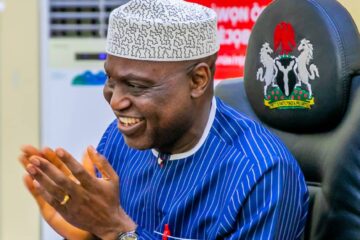
Abimbola Adelakun
By Abimbola Adelakun
Preliminary media analyses of the Federal Government’s formal recognition of other university trade unions are forecasting the end of the Academic Staff Union of Universities. Since the ongoing strike began on February 14, the Federal Government has tried different tactics to end it. From obtaining a court order asking lecturers to resume duties, to issuing orders to the Vice Chancellors to reopen the universities (and rescinding the same order a mere few hours later), to their latest action of recognising new academic trade unions, a breakaway group called CONUA—Congress of Nigerian University Academics—and another called NAMDA, Nigerian Association of Medical and Dental Academics, their desperation to end the strike is mounting. If acknowledging a faction truly facilitates ASUU’s demise, only a few will miss them.
For about 35 years, ASUU’s outdated methods of making demands on the government have worn everyone out. No thanks to the failure of creativity on the part of successive governments and ASUU itself, there is hardly any generation that passed through the public university system since the 1980s that has not been a victim of ASUU strikes. Since 1999 alone, ASUU strikes have cumulatively amounted to 55 months. Their reasons for embarking on strike actions have hardly varied: the Federal Government does not understand any other language than industrial actions (true); the Federal Government has no regard for education in Nigeria (also true) and the Federal Government serially fails to honour its own signed agreement (again, true!) What is also true is that the strikes are not as effective a weapon in the hands of ASUU as they imagine. Strikes, in fact, favour a government that has serially failed to create a conducive environment for enterprise to thrive. The time regularly wasted on the strike actions is tantamount to creating “holding cells” where the thousands of young people who are being regularly churned out of the tertiary institution systems will be kept to delay the reality of their entering the labour market and remaining there for a protracted time.
Now that the All Progressives Congress government faces a crucial election next year, they want to force ASUU’s hand by any means necessary. Failure to get students back to class can jeopardise their electoral victory because, not only will the frustrated youths sitting at home play spoilers, even their parents will not take kindly to the candidature of the people who have stolen a year of their children’s lives. The ASUU strike embarrasses the APC campaign and they are desperate for something to give. Otherwise, they have no burning desire to resolve the university education crisis. If they did, they would not sign agreements they had no intentions of honouring with ASUU. Besides, with the shameful degradation of facilities in virtually every Nigerian university, the Federal Government still sets up more universities like pure water factories. Their myopic vision has nothing to do with expanding access to tertiary education; they mostly build universities to pass off the physical structures as evidence of growth and development to their constituents. That is where it ends; those structures are internally empty.
Now CONUA is said to be composed of a set of lecturers who have had it and want to explore other methods of resolving the crisis in education outside the jaded weapons of strikes. Led by a lecturer at the Obafemi Awolowo University, a Dr Niyi Sunmonu, CONUA is brimming with the hope they can break through the conundrum of ASUU’s frequent resort to frequent strike actions. I wish them all the success in their venture.
First, I do not believe that competing unions is the way forward for anything meaningful to be achieved in Nigeria. Believe it or not, unions are an integral part of the degradation of the Nigerian system and it is illusory to think that more of them can correct what has come undone with the current quagmire. Both the government and ASUU, lacking in creativity, are therefore stuck in an impasse of strike actions. The sweeping reforms that the Nigerian university system (and even the education sector generally) needs will not be resolved through union activity. The university system needs rethinking and replanning for effectiveness. Until we have a government with a sincere interest in education and enough integrity to implement full-scale reforms that will introduce standards into academics and administration in the system, we go nowhere.
Like strike actions, the model of administration and even government subsidisation of tertiary education is outdated and needs an urgent overhaul. The few times the government has managed to summon some courage to suggest increasing tuition as a way out, ASUU, still hugging their 1980s socialist textbooks, shouted down the proposal. Some of their retort to the government on funding shows how painfully stuck they are on the old methods. It should not even be their duty to routinely protest tuition. It would be more helpful if they formed think tanks to research school funding and used the objective knowledge to reasonably advocate on behalf of students in their respective universities. ASUU’s visceral reaction to alternative modes of funding is an overreach on their part.
Media reported that Sunmonu, expressing the disenchantment of CONUA members with the tactic of frequent strikes, said their faction would be “engaging proactively in ideologically-unencumbered consultation, dialoguing and lobbying the National Universities Commission, the Minister of Education and the House Committee on Education on the need for enhancing budgetary provisions for education, rather than folding our arms when budgets are being prepared and then going on strike to ask for improved funding.” While Sunmonu’s desire to explore means beyond strikes is appreciated, again, why is that mission the job of the lecturers? Even CONUA does not seem to be thinking outside of the existing schema of lecturers pursuing politics instead of their primary responsibility of academic work. The numbing crisis of the imagination is killing the system and robbing thousands of youths of the time of their lives.
If, along the line, CONUA finds that the Federal Government is as insincere as ASUU claims, what will be their resort? Will they take the option of strike or keep shuttling between the classrooms and the corridors of power until they are heard? Academics’ primary responsibility is to teach and research, not spend valuable time haggling with the government and bureaucrats on how resources should be voted towards the university system. CONUA’s manifesto, meanwhile, has other lofty ambitions. They include making the Nigerian educational system effective and efficient, tackling the issues of sexual harassment, and building rapport between students and lecturers. If CONUA ever embarks on all these, they will usurp the roles of various university administrators, and the officials in both the Ministry of Education and various parastatals.
Now that there are new unions, how does it resolve the problem of the ongoing strike? ASUU says it is not perturbed by the recognition of CONUA because only about 20% of its lecturers belong to the factional body. It is only a matter of time before that figure changes. ASUU members hoping to take advantage of the government’s desperation will start defecting to CONUA. Until then, it remains to be seen how the division will not cause problems when the lecturers under CONUA’s aegis resume teaching but those under ASUU do not. Since the Federal Government seems more interested in managing the politics of education than committing to the proper and effective education sector management, introducing factional unions will be their joker until that method too wears out.
Culled from The Punch











